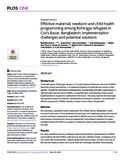| dc.contributor.author | Sarker, Malabika | |
| dc.contributor.author | Saha, Avijit | |
| dc.contributor.author | Matin, Mowtushi | |
| dc.contributor.author | Mehjabeen, Saima | |
| dc.contributor.author | Tamim, Malika Asia | |
| dc.contributor.author | Sharkey, Alyssa B. | |
| dc.contributor.author | Kim, Minjoon | |
| dc.contributor.author | Nyankesha, Ele´vanie U. | |
| dc.contributor.author | Widiati, Yulia | |
| dc.contributor.author | Shahabuddin, A. S. M. | |
| dc.date.accessioned | 2022-05-09T07:13:03Z | |
| dc.date.available | 2022-05-09T07:13:03Z | |
| dc.date.copyright | 2020 | |
| dc.date.issued | 2022-03-26 | |
| dc.identifier.citation | Sarker, M., Saha, A., Matin, M., Mehjabeen, S., Tamim, M. A., Sharkey, A. B., . . . Shahabuddin, A. S. M. (2020). Effective maternal, newborn and child health programming among rohingya refugees in cox's bazar, Bangladesh: Implementation challenges and potential solutions. PLoS ONE, 15(3) doi:10.1371/journal.pone.0230732 | en_US |
| dc.identifier.uri | http://hdl.handle.net/10361/16580 | |
| dc.description | This article was published in The PLOS One [ © 2020 Sarker et al. This is an open access article distributed under the terms of the Creative Commons Attribution License] and the definite version is available at: https://doi.org/10.1371/journal.pone.0230732 The Journal's website is at: https://journals.plos.org/plosone/article?id=10.1371/journal.pone.0230732 | en_US |
| dc.description.abstract | Background
The health status of Rohingya refugees or Forcibly Displaced Myanmar Nationals (FDMNs),
especially women and children, is a significant challenge for humanitarian workers in Bangladesh. Though the Government of Bangladesh, in partnership with other organizations, is
offering health care services to FDMNs, a comprehensive understanding of the program
implementation is required for continuation in the future. This study explores the challenges
and potential solutions for effective implementation of maternal, newborn, and child health
(MNCH) programs for FDMNs residing in camps of Cox’s Bazar, Bangladesh.
Methods
We conducted a qualitative study conducted in Cox’s Bazar district, Bangladesh, which
involved 34 interviews (15 key informant interviews and 19 in-depth interviews) with relevant
persons working in organizations responsible for MNCH services to FDMNs. We relied on
both inductive and deductive coding and applied the Consolidated Framework for Implementation Research (CFIR) as a guide to our thematic analysis and presentation of qualitative data.
Results
Our study identified some key challenges hindering the effective implementation of MNCH
service delivery for the FDMNs. High turnover and poor retention of staff, overlapping of service, weak referral mechanism, complex health information system, and lack of security of
the front line health providers were some of the key challenges identified. Motivating the
PLOS ONE
PLOS ONE | https://doi.org/10.1371/journal.pone.0230732 March 26, 2020 1 / 18
a1111111111
a1111111111
a1111111111
a1111111111
a1111111111
OPEN ACCESS
Citation: Sarker M, Saha A, Matin M, Mehjabeen S,
Tamim MA, Sharkey AB, et al. (2020) Effective
maternal, newborn and child health programming
among Rohingya refugees in Cox’s Bazar,
Bangladesh: Implementation challenges and
potential solutions. PLoS ONE 15(3): e0230732.
https://doi.org/10.1371/journal.pone.0230732
Editor: Vijayaprasad Gopichandran, ESIC Medical
College & PGIMSR, INDIA
Received: October 13, 2019
Accepted: March 6, 2020
Published: March 26, 2020
Peer Review History: PLOS recognizes the
benefits of transparency in the peer review
process; therefore, we enable the publication of
all of the content of peer review and author
responses alongside final, published articles. The
editorial history of this article is available here:
https://doi.org/10.1371/journal.pone.0230732
Copyright: © 2020 Sarker et al. This is an open
access article distributed under the terms of the
Creative Commons Attribution License, which
permits unrestricted use, distribution, and
reproduction in any medium, provided the original
author and source are credited.
Data Availability Statement: Selected transcript
quotes appear within the paper. Audio files from
interviews cannot be made publicly available
health workers, task shifting, capacity building on emergency obstetric care, training CHW &
TBA on danger signs, and ensuring the security of the workers are the potential solutions
suggested by the respondents. Selecting a few indicators and the introduction of E-tracker
can harmonize the health information system.
Conclusion
Providing healthcare in an emergency setting has several associated challenges. Considering the CFIR as the base for identifying different challenges and their potential solutions at a
different level of the program can prove to be an excellent asset for the program implementers in designing their plans. Two additional domains, context, and security should be
included in the CFIR framework for any humanitarian settings. | en_US |
| dc.language.iso | en_US | en_US |
| dc.publisher | PLOS ONE | en_US |
| dc.relation.uri | https://journals.plos.org/plosone/article?id=10.1371/journal.pone.0230732 | |
| dc.subject | maternal, newborn and child health programming | en_US |
| dc.subject | Rohingya refugees | en_US |
| dc.subject | Rohingya refugees in Cox’s Bazar, Bangladesh | en_US |
| dc.title | Effective maternal, newborn and child health programming among Rohingya refugees in Cox’s Bazar, Bangladesh: Implementation challenges and potential solutions | en_US |
| dc.type | Journal Article | en_US |
| dc.description.version | Published | |
| dc.contributor.department | Brac James P. Grant School of Public Health | |
| dc.identifier.doi | https://doi.org/10.1371/journal.pone.0230732 | |

